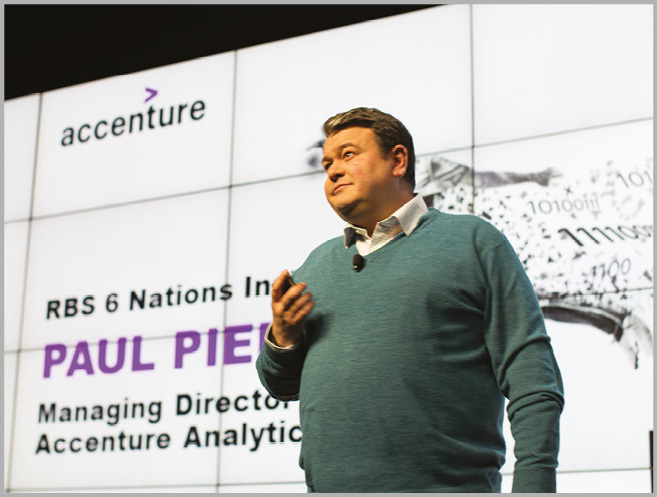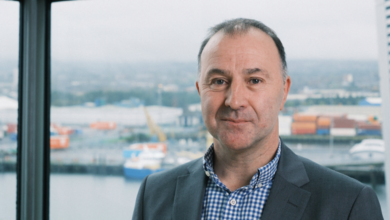Driving the industrialisation of analytics

Head of Analytics at Accenture Ireland, Paul Pierotti, discusses the increasing awareness around the value of data analytics as an all-organisation process and the potential it offers for transformation across Northern Ireland.
With over 1,300 data scientists globally, Accenture’s end-to-end to approach embeds analytics into the fabric of their clients’ business to create new intelligence and unlock trapped value at unprecedented speed and scale. With Ireland as one of its five global analytics centres of excellence, Accenture is powered by new data, new science and new technology and work with clients to drive digital transformation at the core of their business, delivering cost efficiencies and new revenue growth.
Based on 20 years of advanced analytics experience across all industries, Pierotti is well placed to describe the evolution of data analytics: “Six years ago my role centred on demystifying for people what data analytics was and the potential it had for delivery. Now my conversations are much more about analytics as a requirement of the strategic transformations businesses are required to make and the delivery of analytics in a sustainable way.”
In Ireland, the leading global professional services company provides a range of services for both the public and private sectors and have capitalised on the digital evolution. “Analytics is the engine of digital, the entire purpose of digital is to transform the services provided and deliver them in a unique way to each individual consumer or customer. That requires specific insights on that individual and their potential and future needs. Analytics is now across the board because digital is now across the board,” he adds.
Pierotti describes a shift whereby previously organisations utilised expert pockets of analytics to an industrialisation stretching throughout an organisation. This transition has been driven by a greater understanding of how data analytics has the strategic capability to enhance an organisation. “Where data analytics would have been used previously to map out future problem areas within the health sector or within the public sector, for example, this is no longer enough. It needs to be embedded in organisations as usual process and it needs to be a core strategic requirement to achieve value.”
One example he points to is the growing pressure placed on the health system by an ageing population in Northern Ireland: “Northern Ireland has a younger population than England and Scotland and we know that increasing pressures are coming down the line if we do nothing. Right now, Northern Ireland has a great opportunity to make some of the strategic transformations required to prevent increased levels of pressure. Utilisation of data analytics with the right processes can deliver a range of benefits, including a reduction in hospital visits, and in doing so make the health system more affordable in 10 years’ time.”
Industrialisation
Failure to recognise value, he admits, has led to some organisations becoming disillusioned with data analytics but he explains that this can largely be identified as a failure to implement a fundamental shift. “Industrialisation is about using the data, which organisations often spend time collecting anyway, as a strategic asset. This means building the infrastructure around that dataset that will allow staff to have the conversation to innovate and understand and derive the insights needed to change processes.”
Northern Ireland, he believes, has the potential to be a global leader in implementing this new way of working and as a result, benefit through economic growth and better service delivery: “Northern Ireland currently has a relatively well connected health and government services and connectivity between data and processes, however, there also exists a huge opportunity to improve our healthcare and government interventions based on ongoing learning.
“Strategically Northern Ireland is the perfect sized region to implement change. It’s big enough to make the strategic investment needed to enhance the current skillset. The knowledge economy has been identified as a key area for economic growth and investment in skills for this area will be a huge positive. Currently those skills exist but not on the scale necessary for massive change and this is where government and healthcare investment in the data analytics industry could be of huge benefit.”
Despite advocating for a large-scale investment allowing for Northern Ireland organisations to industrialise data analytics and hone expertise, Pierotti is steadfast that changes can be made now with the information available. He explains: “Northern Ireland is sitting on some wonderful datasets, particularly in relation to primary and secondary healthcare, but we can’t afford to use the excuse of waiting for an electronic health or medical record not to implement change now. There are people currently in hospital who predictably were always going to end up there in the absence of intervention. Using the data currently available, changes can be made to processes that would reduce this number.”
Working with the University Hospital of La Fe in Valencia, Accenture developed a predictive health analytics model identifying patients at risk of hospitalisation before admission and reducing overall hospital demand by 20 per cent. The model classifies patients with a high degree of accuracy and identifies the potential for ‘intense’ periods long before they occur so that early interventions can be taken and bespoke care plans put in place for patients. The same model was applied to Northern Ireland in a desk-based exercise and the potential benefits are significant. For example, applying the same data driven approach to early intervention in Northern Ireland could free up over 1,800 beds per year and reduce costs by close to £170 million.
Proof of value
A reoccurring challenge presented to Accenture exists in organisations struggling with the governance of insight decision-making based on the capability of data analytics. Often organisations are struggling to find a balance between delivering proof of value for scheme implementation and then industrialisation.
Pierotti explains that testing before mass implementation is a priority: “Standing up a business case is important. If it works then it needs to be integrated into an organisation as usual process. If it doesn’t then because of the small agile capability of the testing method, it can be turned off quickly. The idea is to then pass on these successful business cases to a more industrialised delivery team focussed on delivering value. I think the organisations that are getting frustrated with data analytics haven’t thought through this decision structure or the industrialisation structure.
“The design of any implementation is also key. My analytics team works hand in hand with colleagues from our Accenture Interactive team who come at things from a design perspective. The outcome is that the analytics team can provide the deep insight, while the design team work out the best way to present this to the representatives of an organisation in a way that they can utilise it. This allows for them to fully understand the value of the information they are collecting and give them an opportunity to collaborate on information that could aid them.”
Future and Artificial Intelligence
Paul is also excited about the Future of Healthcare programme at The Dock, Accenture’s multi-disciplinary research and incubation hub, which is based in Dublin and has over 200 staff. “Our innovation projects in Ireland are showing that disciplines such as artificial intelligence and virtual reality can be used today to transform healthcare. The future is here now. It just needs to be industrialised.”
Looking forward, Pierotti states: “We see a significant opportunity to transform health and government services in Northern Ireland. That transformation needs industrialised insight and analytics at the heart of it. As the leading provider of analytics in Ireland we are best placed to help deliver these insights.”

Paul Pierotti Head of Analytics at Accenture Ireland
T: +353 1 646 2254
E: paul.pierotti@accenture.com
W: www.accenture.com/analytics






